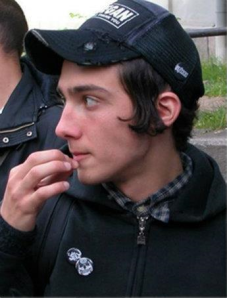
Timur Kacharava, étudiant en philosophie, était militant antifasciste et vegan. Il était membre du collectif Food not Bombs (récupération et distribution de nourriture vegan aux personnes dans le besoin), mais aussi des groupes anarchistes Sandinista et Distress. Le 13 novembre 2005, après une distribution pour Food not Bombs, il est suivi par une dizaine de néo-nazis qui le poignardent à cinq reprises. Bien que la justice essaie de faire croire que ce crime n’est pas politique, prétextant un affrontement enter hooligans, la famille de Timur assure que son meurtre est intimement lié à son militantisme. Selon eux, le groupe fasciste était organisé et préparé à commettre cet assassinat prémédité et politique.
Over 3,000 St. Petersburg State University students petitioned the President of Russia, Vladimir Putin, to find and punish the murderers. In December 2005, police arrested seven suspects who eventually admitted to the crime. On 7 August 2007, Alexander Shabalin was sentenced to 12 years in prison on charges of a murder and incitement to ethnic or racial hatred. Six other members of the gang, who held Kacharava and prevented him from resisting, were charged with inciting social hatred, and were given suspended sentences.[4]
The main defendant in the trial was 14 years old.[5]
Russian human rights association Agora considered the trial as the most important achievement of human rights defenders in Russian courts in 2007.[6]
Kacharava’s family, friends and colleagues remained convinced that Kacharava was the victim of an organized and well-armed neo-Nazi group. His friends testified that he had been followed, received threats by telephone, and been targeted before. According to Galina Stolyarova citing the victim family’s lawyer in Transitions Online, the court accepted the scenario in which the murderer claimed he had spontaneously suggested beating up an anti-fascist activist, and did not charge the other assaulters as accomplices in the murder.[7] Kacharava’s death led some of Russia’s young anti-fascists to change tactics and use violence against neo-Nazis and racists.[4]